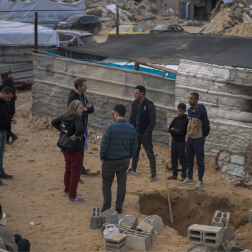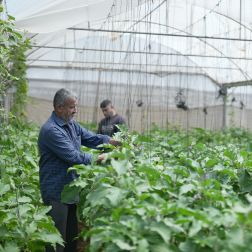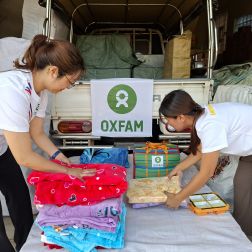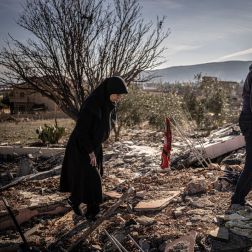- 6 mins read time
- Published: 25th April 2016
Building back stronger in Nepal, one year on

Oxfam has provided water and sanitation in temporary schools in Gorkha, Nepal, after many were destroyed in the 2015 earthquake. Photo: Kieran Doherty/Oxfam
On 25 April 2015, Nepal was struck by the first of two major earthquakes that left nearly 9,000 people dead and destroyed or damaged more than 850,000 homes.
I was in Nepal in the immediate aftermath of the first quake and saw first-hand the difference your donation made as we were able to provide clean water, sanitation, emergency shelter materials, food and other vital relief.
Your donation has helped not only provide immediate aid like shelter, blankets and clean water but also now the hope of a return to normality.
Critically, your support also means that Oxfam can continue to support affected communities throughout what will be a long road to recovery.
Over the last year, Oxfam’s response has benefitted 481,900 people in seven of the worst-hit districts of Nepal with:
- 49,978 emergency shelters
- 13,097 winter kits including blankets and thermal mats to provide protection in freezing temperatures
- 54,365 hygiene kits to enable people drink and wash safely Installation of more than 150 large clean water storage tanks
- Over 7,000 toilets or latrines
- 2,300 cash grants, tools and training to help families rebuild their livelihoods
- Cash-for-work programmes for over 20,400 families
Bimala, Gana and Netra are just some of the thousands of people supported at the most challenging of times. Their stories are powerful examples of how your support has enabled Oxfam to rebuild communities, restore livelihoods and help people return to normality, stronger and better prepared than before.
BIMALA’S STORY

Bimala Balami can piece her life back together after participating in an Oxfam cash-for-work programme in Kathmandu Valley. Photo: Kieran Doherty/Oxfam
Bimala Balami’s life was devastated by the earthquake, which destroyed her home in Dachi Nkali municipality, in the Kathmandu valley. Bimala recalls: “My mind went completely numb. I couldn’t think. I only cared about my baby. I just wanted to protect my child.
“After the earthquake people didn’t know what they would do or how they would earn. Oxfam came in and now the women in the village know they can provide for their families.”
On the hillside fields where her local community grow rice, wheat, mustard, peas, cucumber and other vegetables, the irrigation channel that provides water for the crops was badly damaged as a result of a landslide triggered by the earthquake.
Oxfam has responded with your support by paying groups of 30 women, including Bimala, to construct a new irrigation channel. This provides the women with an income and the community with prospects of a substantive harvest.
Bimala is part of the group working on the new channel. “I like the job that I am doing because I know it is for the welfare of my entire village. People do need proper irrigation for their fields and I know that. If I don’t do this work people won’t even be able to eat.”
For people like Bimala, trying to piece their lives back together after the earthquake, cash-for-work projects such as this make the critical difference between hope and despair. It creates opportunity to rebuild not only individual lives but also that of whole communities at the same time.
In all we have organised 25 similar cash for work programmes in the area where Bimala lives involving 600 people, including clearing debris and repairing roads damaged by the earthquakes and subsequent tremors. Across our response, over 20,000 households have benefitted from such schemes.
GANA'S STORY

Gana Butrai received livelihood support in the form of a small business grant from Oxfam. Photo: Kieran Doherty/Oxfam
We have supported women across four districts with financial support in the form of cash grants to enable them to restart their businesses and get their livelihoods back on track, including shop-keeper Gana Butrai.
“The day the earthquake happened I was actually in my shop,” she recalls. “The only thing I was thinking was will I live or will I die. I didn’t look at my watch but it felt as though it went on for at least half an hour. The ground felt like it was shaking for almost an entire day.
“The building was damaged in the earthquake; it used to have a top floor but it fell down and the wall on the left fell down as well.
“I had to ask people to come and help me but I couldn’t retrieve all of the items and lots of them expired. So I had to start again, reconstructing the entire space. Things have become a lot easier since Oxfam has helped.
“The first help that Oxfam gave me was a grant of 4,000 rupees and since then they have helped me with material support. I would like to thank you from the bottom of my heart.”
NETRA’S STORY

Business is now booming for trader Netra Parajuli after Oxfam’s support. Photo: Kieran Doherty/Oxfam.
We are distributing vouchers so people can buy what they need to restart their farms, businesses and kitchen gardens – which is good news for traders like Netra Parajuli. Before the earthquake, Netra ran a thriving shop in Lamosanghu, but like thousands of others, his livelihood was destroyed in the disaster.
“Everything started moving and we all started running towards the door. Slabs of concrete were falling all around us. I thought they would kill me.
“I couldn’t breathe; there was dust everywhere. I tried to see someone around me but I couldn’t see anyone. I thought I was dead. Suddenly a wall broke and I saw light. I ran towards it.
“Everything was under the debris. We couldn’t even dig the dead people out. I started breaking the concrete so that we could pull people out. That day I pulled four people alive from the rubble. They were trapped and I could hear them crying. I had no idea how many people had died then.”
With the stock he salvaged, Netra has managed to set up a temporary shop, and thanks to Oxfam’s voucher scheme, business is now back on track.
“I’ve had almost 900 people come to my shop because of the vouchers being distributed. The most popular items have been the spade, then hoe and then the watering can. If people’s tools are damaged, I repair them. I make the hoes myself.”
Oxfam has distributed over 6,000 vouchers to help people buy agricultural tools and supplies, with each voucher worth 2,000 rupees (around €17/£13). The distribution supports not only the people receiving the vouchers, enabling them to restart their kitchen gardens and farms, they also support local traders and store owners like Netra and reignite the local economy.
A further distribution is planned to commence soon, supporting local communities with livestock and grain storage through cash grants. In addition to direct assistance, Oxfam is advocating with national and local authorities in Nepal for the roll-out of a recovery process and plan that ensures no-one is left behind – especially women and other marginalised communities with limited resources or opportunities even before this crisis and who are now only more vulnerable.
We are urging a reconstruction effort that builds back better, creating a fairer, more equal and inclusive society than before.
Colm Byrne is Oxfam Ireland’s Humanitarian Manager.




